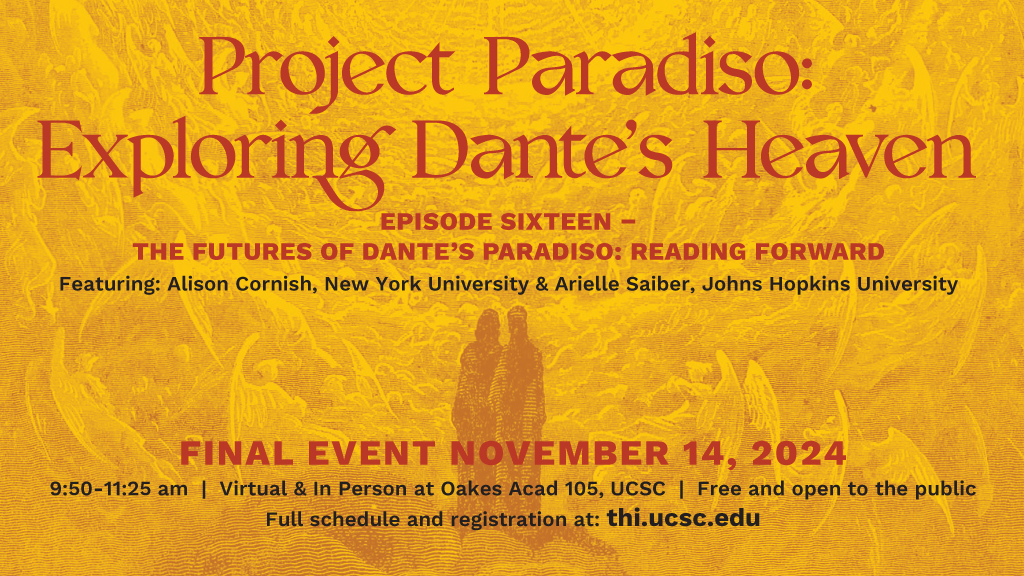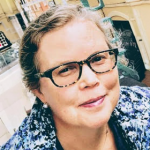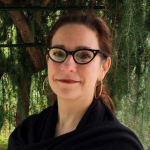Events

- This event has passed.

Project Paradiso – Episode Sixteen – The Futures of Dante’s Paradiso: Reading Forward
November 14, 2024 @ 9:50 am - 11:25 am | Virtual and In Person
Join us for a conversation with Prof. Alison Cornish (New York University) and Prof. Arielle Saiber (Johns Hopkins University), about the challenges and opportunities of reading Dante’s Paradiso today, particularly in, but not limited to, the academic context. They will explore innovative future directions to take this poem to as many readers and diverse audiences as possible, and also why this should be done, especially in view of the textbook that will be complied as a result of this year-long webinar series.
This event will be will be in person at Oakes Acad 105 and via Zoom (registration required).
Dante’s Paradiso is the least studied and the least understood of the three parts of the Commedia. Yet it is arguably the most important for the dynamism and originality of the literary, theological, and philosophical inquiries that take place there. It is also a singularly important interpretive guide for a full understanding of the entire Commedia. It is a poem that asks to be tackled by a community of engaged readers. This year-long series of webinar workshops led by world-renowned scholars took readers on a deep reading of the Paradiso and an unforgettable journey to the heart of Dante’s universe. See the Project Paradiso page for full schedule.
Featuring:
 Alison Cornish, Professor of Italian Studies at New York University and President of the Dante Society of America. She is the author of Reading Dante’s Stars (Yale, 2000), Vernacular Translation in Dante’s Italy: Illiterate Literature (Cambridge, 2011) a commentary on Dante’s Paradiso, translated by Stanley Lombardo (Hackett, 2017), and Believing in Dante: Truth in Fiction (Cambridge, 2022); as well as a number of essays on Dante, Petrarch and Boccaccio. During the seventh centenary of the poet’s death, she organized a crowd-sourced series of video conversations between members of the Dante Society of America, entitled “Canto per Canto: Conversations with Dante in Our Time.”
Alison Cornish, Professor of Italian Studies at New York University and President of the Dante Society of America. She is the author of Reading Dante’s Stars (Yale, 2000), Vernacular Translation in Dante’s Italy: Illiterate Literature (Cambridge, 2011) a commentary on Dante’s Paradiso, translated by Stanley Lombardo (Hackett, 2017), and Believing in Dante: Truth in Fiction (Cambridge, 2022); as well as a number of essays on Dante, Petrarch and Boccaccio. During the seventh centenary of the poet’s death, she organized a crowd-sourced series of video conversations between members of the Dante Society of America, entitled “Canto per Canto: Conversations with Dante in Our Time.”
 Arielle Saiber, Charles S. Singleton Professor of Italian Studies in the Department of Modern Languages and Literatures. Saiber’s books include Images of Quattrocento Florence: Writings on Literature, History and Art co-edited with Stefano U. Baldassarri (Yale, 2000); Giordano Bruno and the Geometry of Language (Ashgate/Routledge, 2005); and Measured Words: Computation and Writing in Renaissance Italy (University of Toronto Press, 2017).
Arielle Saiber, Charles S. Singleton Professor of Italian Studies in the Department of Modern Languages and Literatures. Saiber’s books include Images of Quattrocento Florence: Writings on Literature, History and Art co-edited with Stefano U. Baldassarri (Yale, 2000); Giordano Bruno and the Geometry of Language (Ashgate/Routledge, 2005); and Measured Words: Computation and Writing in Renaissance Italy (University of Toronto Press, 2017).
Saiber publishes primarily on Dante, on the intersections between premodern Italian literature and mathematics/science, and visual interpretations of Dante’s Commedia. She has also published on early print history, science fiction, and experimental electronic music. Her current research is on “altered states of consciousness” in medieval and Renaissance Italian literature.
She has co-edited a number of special issues of academic journals: for Configurations, “
Her doctoral dissertation on Giordano Bruno won Yale’s Field Prize (2000), and in 2004 she received the Karofsky Prize for teaching at Bowdoin. She has been a fellow at the Istituto Italiano per gli Studi Filosofici in Naples, Italy (1998-1999), the Radcliffe Institute for Advanced Study (2003-2004), and Villa I Tatti – Harvard’s Center for Renaissance Studies in Florence, Italy (2008-2009). She also received an NEH Fellowship (2008-2009), the MLA’s Scaglione Publication Award (2016), the Newberry Library’s Weiss-Brown Publication Award (2017), the American Initiative for Italian Culture’s Bridge Book Award (2018), and the Society for Literature, Science, and the Arts’ Kendrick Book Prize (2019) for her book Measured Words.
In 2006 she built the web-based archive, Dante Today: Sightings and Citings of Dante’s Work in Contemporary Culture, which she now co-edits with Beth Coggeshall.
She co-edits the new book series Proximities: Experiments in Nearness with David Cecchetto for the University of Minnesota Press.
Presented by the Humanities Institute and the Department of Literature Italian Studies. Sponsored by the University of California Humanities Research Institute, Siegfried and Elizabeth Mignon Puknat Literary Studies Endowment, and Porter College.

